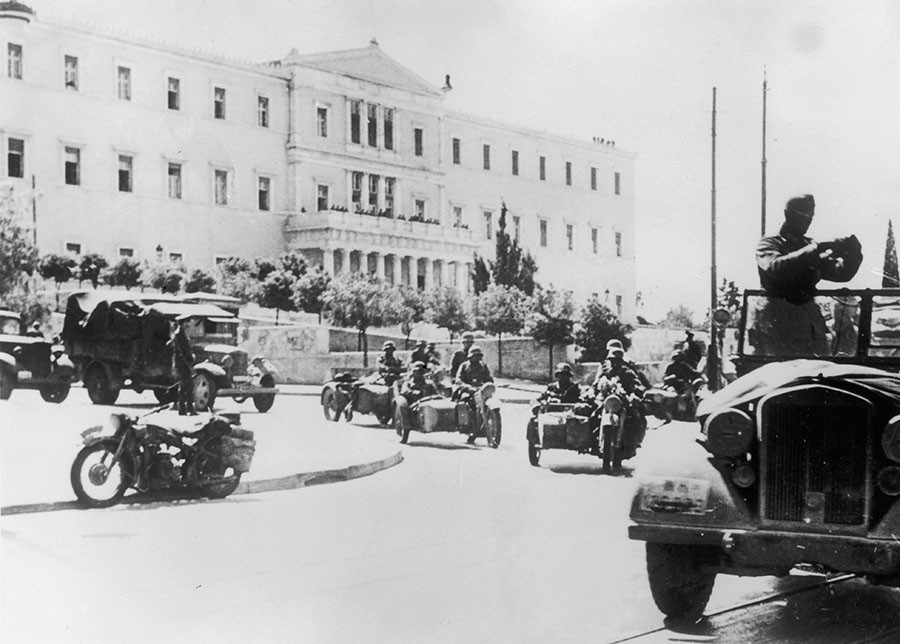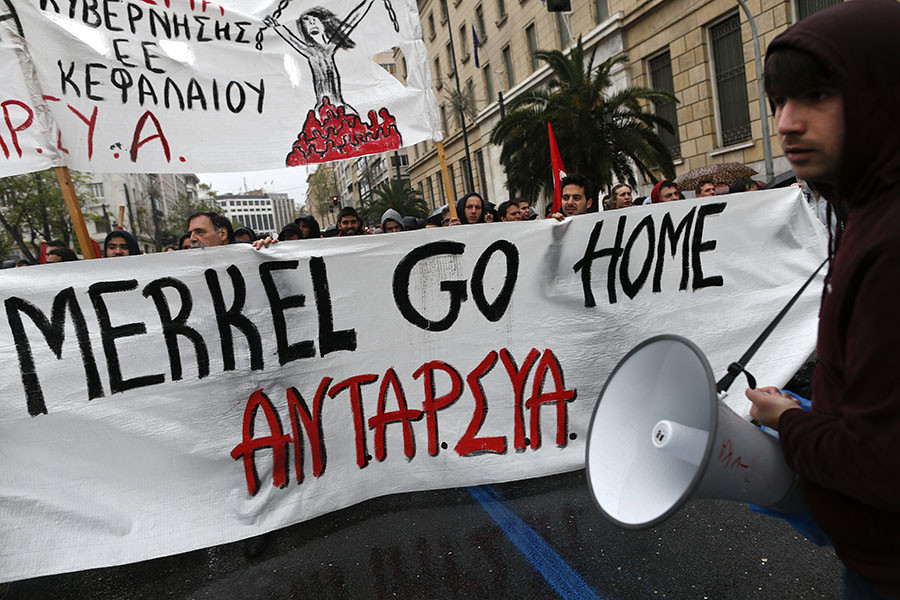Greek President Prokopis Pavlopoulos said that his country would demand that Germany pay reparations for the damage caused to it during the Second World War. These words were spoken at the gala dinner in honor of the German President Frank-Walter Steinmeier, who arrived on the eve of a visit to Athens.
“We believe that the demands of Greece for the reimbursement of the occupation loan and the payment of war reparations are legally justified and can be subject to legal proceedings,” Pavlopoulos said.
Earlier, during a visit to the island of Kandanos on Crete, where the fascists executed 180 inhabitants in 1941, Greek Prime Minister Alexis Tsipras said that the requirement of reparations was the “historical duty” of the Greek government. Greek parliament chairman Nikos Vucis in September argued that in the next two months, the legislature would consider putting forward demands for Berlin.
“They may try to start demanding reparations through the International Court of Justice,” said Alexander Treshchev, plenipotentiary representative of the EU Bar Association in the Russian Federation, expert in international law, in an interview with RT. “This is the only instance that can consider such things today.”
Roots of the problem
In the years 1940-1944, the territory of Greece was occupied by Germany, Italy and Bulgaria. During the war years, the southern European state, in which 7 million people lived before the conflict, lost more than 400 thousand citizens, of whom more than 300 thousand were civilians. Most of the industry was destroyed, and after the liberation of Greece from the invaders a bloody civil war broke out, which lasted until 1949.

- Wehrmacht enters Athens, May 1941
- Gettyimages.ru
- © Keystone
In 1947, the countries of the anti-Hitler coalition concluded the Paris peace treaties with the allies of Germany. According to these documents, Greece received as reparations $ 105 million at the rate of 1938 from Italy and $ 45 million from Bulgaria. At the same time, at the Paris Peace Conference, it was determined that the share of Greece in the total amount of monetary reparations, which Germany was supposed to pay, is 2.7%. In addition, the country was to receive 4.35% of the ships and other equipment of the former Third Reich. However, according to the results of the Second World Peace Treaty with Germany, similar to the fact that the winners signed with its allies, it was not concluded, and Greece never received its money.
In 1960, in order to remove this problem, the German government concluded an agreement with Greece to pay 115 million marks to the victims of the German occupation (about € 59 million at the 2015 exchange rate).
However, the question of the fate of the so-called occupation loan remained unresolved. During the war, the Nazis withdrew from the Bank of Greece an amount equivalent to today's € 10 billion, having issued it as a loan. In 1953 in London, an agreement was reached on the debts of Hitler's Germany with its creditors. By its terms, most of the debt should have been paid at the conclusion of a peace treaty and after the unification of Germany. But an agreement of this kind was not concluded again, and Greece did not return its money.
After the government of Alexis Tsipras came to power in Greece in 2015, Athens again began to raise the issue of reparations. Three years ago, the Greek Ministry of Finance exposed Berlin with a bill of € 300 billion for damage caused during the Nazi occupation. At the same time, Athens emphasizes that this amount is significantly less than what Greece owes according to the documents adopted at the Paris Peace Conference of 1946.
"It will be easier to pay off"
However, until recently, the Greek authorities again "forgot" about this issue.
Experts attribute this fact to the fact that in August 2018, the external macro-financial assistance program (€ 80 billion) of Greece ended, the third stage of which began in August 2015 and which was provided by the “troika” of international lenders: the ECB, IMF and the EU. Germany, as the first eurozone economy and one of the leading EU countries, played a special role in providing economic assistance to Greece.
“Now the money is running out, you need to take it somewhere,” explained RT leader Alexander Kamkin, a leading researcher at the Center for German Studies at the Institute of Europe, RAS, who explained Athens’s interest in reparations. - Plus, in the mass consciousness of Greece, Germany continues to be associated with the Third Reich. Then the military dictated it, now it is economic. ”
At the same time, the ordinary Greeks did not see any economic assistance proper, most of which settled in banks. But felt the effects of austerity measures, which insisted on Berlin. As a result, the debt crisis began to be perceived by the South European state as an instrument of the enslavement of “small” Greece by “big” Germany. And when they demanded that Greece pay its debts, Athens remembered that Berlin owed them too, experts say.

- The Greeks are protesting the visit of Angela Merkel to Athens. April 11, 2014
- Reuters
- © Alkis Konstantinidis
According to Ivan Konovalov, director of the Center for Strategic Conjuncture, the fact that Greece decided to remind of reparations again is also connected with the unstable political situation that has developed within the EU: Brexit, contradictions on migration issues, independent policies of Poland and Hungary. In such circumstances, Berlin is not beneficial conflict with another state.
“Since Germany is the basis of the European Union, the Germans, according to the Greeks, will be easier to buy off. Otherwise, the EU will collapse further, they say, ”Konovalov said in an interview with RT. “They are blackmailing Germany, behind all this lies such a subtext: if the Germans will not help, then the end of the European Union.”
Bones instead of money
Greece is far from the only European Union country demanding the payment of war reparations from Germany. So, on October 5, the head of the Polish parliamentary committee on reparation payments Arkadiusz Mulyarchik stated the need to recalculate the amount that Berlin, in his opinion, owes Warsaw for losses suffered during the war and occupation. Previously, the Poles demanded from Germany up to $ 850 billion.
The two-plus-four treaty concluded at the unification of Germany in 1990 between the Federal Republic of Germany, the GDR, the USA, the USSR, France and Great Britain (the Final Settlement Treaty in respect of Germany) formally closed the question of war reparations from Berlin. Based on this decision, Germany traditionally claims that it will not make any more payments. However, both Athens and Warsaw insist that they never refused reparations.
According to Deutsche Welle, Mularczyk and his Greek colleague Triandafilos Mitafides confirmed to the German media that the Polish and Greek reparations committees are actively working together to obtain the required money from Germany.
Another country that in 2017 put forward claims for the payment of reparations to Germany is Namibia. Until 1918, this territory was called “German South-West Africa”. It was here in 1904, during the suppression of the uprising of the people of Herero, the troops of Kaiser Germany killed several tens of thousands of people.
Now the Herero and Namibian authorities are demanding compensation and recognition of responsibility for the genocide, although the exact amount has not yet been called. Representatives of the Herero even filed last year in Germany in one of the courts of the State of New York. However, while the Germans returned to Africa only a collection of skulls, collected as a result of the suppression of the uprising. Germany also provides economic assistance to Namibia, but officially these payments are not reparations.

- Representatives of the Herero people in Namibia
- Reuters
“For German society and the government, the issue of genocide is more painful than the purely monetary demands of Poland and Greece. The Namibian government has hit the Germans in a sore point, Kamkin notes. “However, it’s hard to say how the Namibian issue will affect the payment problem of reparations in Greece.”
“There are no prospects”
Experts interviewed by RT doubt that the German government will decide to make concessions to Greece or Poland and pay the required reparations.
“I think that Germany will not do this,” said a senior researcher at the Institute of Military History at the Military Academy of the General Staff of the RF Armed Forces, German specialist Vladimir Deines, in an interview with RT. - If Germany pays Greece, it means that she will have to pay everything else. And almost automatically. The queue lined up considerable. Since every second country in Europe will begin to demand. ”
According to Konovalov, “it is unprofitable for Germans to pay to Greeks and Poles, since such claims will be presented by Czechs, Slovaks, Danes and Norwegians”, who did not receive reparations after World War II.
“Purely theoretically, if we take the worst scenario for Germany, Austria may also demand compensation,” notes Alexander Kamkin.
However, the specialist considers the countries of Eastern Europe to be the most likely candidates for German money.
“Most likely, Germany will get off with“ workaround ”bonuses. Pay off the minimum, "- says Konovalov.
From a legal point of view, notes Alexander Treshchev, those who demand compensation from Germany have no prospects.
“Everything was agreed by the parties to the Nuremberg process, and this part of the story is closed. Everything has long been divided and divided, and all issues have been resolved, ”the expert emphasized.
Also, according to him, it is unlikely that any of the applicant countries will be able to submit the documents necessary for the UN International Court of Justice to require Germany to pay reparations.
“In addition, there is the problem of inadequate defendant. After all, in many respects it is not the country that is to blame for war crimes, but one political party, representatives of which the Greeks and Poles are unlikely to find, ”Treshchev concluded.
